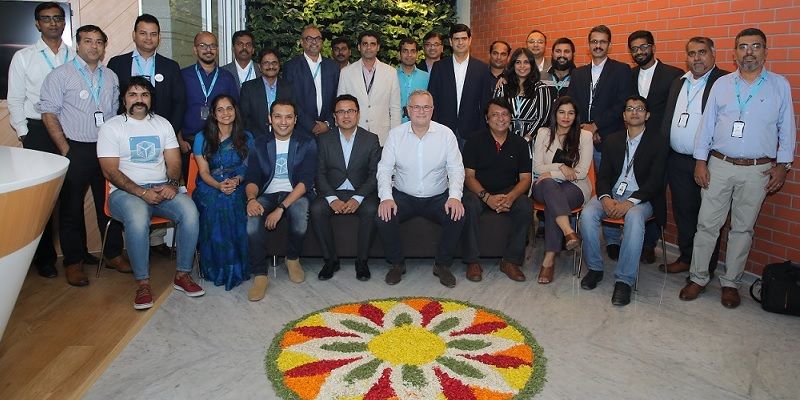A sea of opportunity: how shipping leader Maersk leverages India’s startup talent through its OceanPro accelerator
In an interaction with YourStory, Sriram Narayanasami, VP Commercial, Maersk Line, tells us what the company is intending to achieve with its accelerator initiative OceanPro.

[This article is part of Startup Hatch, the YourStory series on incubators, accelerators, makerspaces and co-working spaces in the startup ecosystem. See earlier profiles of initiatives at IIT Bombay, IIM Bangalore, BITS Pilani, NCL, Tata Elxsi, Axilor, NID, IIIT-Bangalore, IIIT-Hyderabad, Vellore Institute of Technology, PSG Coimbatore, Workbench Projects, Makers Asylum, Appy Hours, Turning Ideas, NetApp Excellerator, Pitney Bowes Accelerator, TechStars, Indigram Labs, WeWork, Z Nation Lab, Sandbox Startups, Brigade REAP, Target India Accelerator, Zone Startups, Ashoka Innovators, and Startup Leadership Programme.]
The shipping industry is being transformed by the next wave of digital technologies, and Indian startups are grabbing some of the action at Maersk’s Bengaluru accelerator.
Sriram Narayanasami is VP Commercial at Maersk Line, and founder of the NGO Sublime Causes. His team of over 5,000 colleagues at Maersk is responsible for serving customers in 110 countries around the world. He was earlier at P&O Nedlloyd, and graduated from IIT Bombay.
Sriram joins us in this chat on Maersk’s accelerator initiative OceanPro, profiles of the first cohort of startups, and opportunities for entrepreneurs in India.
YourStory: What is the scope and scale of innovation at Maersk, and how does it support your growth strategy?
Sriram Narayanasami: The digital revolution has fundamentally impacted behaviors and trade patterns over the last 5-10 years, leaving its mark on many industries. The transportation and logistics industry has undergone transformation on the physical side of the business, eg. size of vessels, type of vessels, retrofitting, terminal automation.
While more transformation is expected in the physical aspects of the shipping business, we at Maersk also see tremendous potential and opportunity in the service side of the business such as reducing the complexity of container shipping, overcoming lack of standardisation, and ability to adjust to multiple unforeseen events in the handling process. The underlying processes in shipping remain largely manual, paper-based and typically with little standardisation between different countries and authorities.
We ship one out of five containers and one of four reefer containers globally, corresponding to approximately 13 million 40-foot containers annually. For each container shipped, there may be up to 30 different parties involved, communicating up to 200 times. Although we have seen some development over the last decade, the basic shipping experience is virtually unchanged from a customer’s point of view.
We want to transform the industry by reducing the complexity. We believe it should be as easy for our customers to ship a container as it is to send a parcel with a postal carrier, and this fits in perfectly with our growth strategy and vision of becoming the global integrator of container logistics, connecting and simplifying our customers’ supply chains.
YS: What was the founding vision of your accelerator OceanPro, and how is it supported?
SN: The vision is to accelerate transformation using innovative capabilities from startups to generate value for business.
This vision is supported by senior leadership within Maersk investing their time and resources towards the innovation agenda with a collective understanding that this is an important lever within our innovation toolkit.
YS: What is the selection criteria for your cohorts?
SN: We have internally identified business verticals that have a direct impact on our revenue and costs. We shortlist startups that bring in the relevant technological expertise to support these business areas.
YS: What is the profile of the startups in your first cohort?
SN: Linked Dots, founded by Devaraj Srinivasan, Dhandapani MK, and Ravikant Varahagiri, is an industrial IoT solutions company providing contactless continuous presence management of people and things. It provides this solution for logistics and manufacturing plants.
Unido Labs, founded by Ranjeeth Thyagarajan and Sridhar Santhanam is a customer experience management organisation for companies of all sizes across multitudes of industry verticals. Their proprietary social media insights engine helps organisations listen to social conversations in real time, analyse data to identify patterns and extract correlations, and act on processed data to drive business decisions.
La Vela Pictures, founded by Chaitanya Modha and Yathirajan V. and Kailas Sanap is a media tech startup focused on the development of fresh content for new media, web, broadcast and film with technology to produce best-fit content such as AR, VR, MR, and 360-degree videos.
Zasti.ai, founded by Raj Jagannathan and Ramanathan Srinivasan is an AI technology platform built using proprietary deep learning algorithms that helps business and their clients in predicting risks and improving efficiency.
MintM , founded by Sachin Garg, is a computer vision-based data platform that helps physical businesses with real time measurement, analysis and automation.
Inatrix, founded by Venkat Hari, Sumant Dubey and Vinay Mehendiratta, is a software services company headquartered in New Jersey with focused on providing solutions on robotic process automation, AI and machine learning.
Dhruv, led by Deepak Kapoor, is a Maersk internal startup and a first-time enabler of track and trace by leveraging data and not IoT. With enhanced data capabilities that Maersk has developed in the recent past, we are able to create event-based tracking by stringing data from multiple systems, and by leveraging external data sources.
KrypC, founded by Ravi Jagannathan and Venkataraman VS, is a blockchain platform (B2B) company backed by seasoned professionals who are focused on accelerating adoption of blockchain technology.

YS: What is the profile of the managers of your accelerator?
SN: Gowri Shankar Paramasivam is the sourcing lead for the startup accelerator OceanPro. He was earlier at Amazon, RBS and RR Donnelley, and graduated from IIM Bangalore and Madras University.
Mahesh Menon is the Accelerator Program Leader at Maersk. He was earlier at Infosys and GTL, and graduated from IIM Bangalore and University of Pune.
YS: What would you say are the top three opportunities for Indian entrepreneurs?
SN: In India, there are so many opportunities available for new as well as existing entrepreneurs.
- The Indian government initiative ‘Make in India’ has been successful in providing motivations to entrepreneurs who would like to bank on the immense potential of digitising opportunities.
- India is a developing country and it is one of the biggest markets in the world as per diversity and population point of view.
- There is great scope within manufacturing, keeping in mind the surplus availability of land, labour and capital within India.
YS: What are the key challenges faced by startups in India, and how can you help bridge the gap?
SN: The challenges are difficulties in long-term association, and access to funds for scaling up; access to genuine business problems, especially within transport and logistics; access to actual data; and exposure and fit within the international market.
YS: Who are some of your institutional partners, and what kinds of agreements are in place?
SN: We are in discussions with TechStars for a strategic partnership. We are also in talks with Nasscom and YourStory to find the right synergies to partner with them on a relevant programme.
YS: What grants, support and services do startups receive in your accelerator?
SN: We provide $20,000 to $25,000 in grants for proof of concept. Startups will have an opportunity to pitch to Maersk, and other potential investors after the programme. Startups can connect with customers, and co-develop solutions using Maersk’s data. They get access to Maersk to build and support the business from idea to concept and scaling for growth.
Startup teams also get coaching by business mentors who have years of experience within the shipping industry. Furthermore, the startups get an opportunity to network and learn from other startups.
Startups get co-location space in Maersk India offices for 12–16 weeks. We partner each startup with an entrepreneur in residence; they are our in-house process SMEs from the area of business cases and work dedicatedly with the startup on the POC. This helps to accelerate the progress towards the solution.
YS: What percentage of equity do you charge your startups?
SN: None. We are excited to tap the thriving startup ecosystem in India and are keen to contribute back to it.
YS: What kinds of IP are being created by your startups?
SN: We are exploring and leveraging the tech capabilities of our startups, and yet to decide our plan of action on potential IPs that we would be creating in the process.

YS: How would you differentiate your accelerator from the other accelerators in the field?
SN: While we take inspiration from the existing accelerators in the ecosystem, we are also keen to differentiate ourselves in the intent of best interests for us and the startups. We engage with the startup once we have identified a business problem relevant to their proprietary tech, and solutioning starts almost immediately. We enable the maximum output in the 120 days.
We are interested in a long-term, scalable association, and most experiments are conducted on a global landscape and not limited to our business in India. Each business case is sponsored by a senior functional leader who has vested interests in the results and is keen to convert the experiments to reality.
‘Entrepreneurs in Residence’ is a title that lets our business leaders to operate as a part of the startup team during the 120-day acceleration. making them intertwined and accountable for results.
Another distinguishing feature is internal entrepreneurs – we are also encouraging internal startups, allowing employees within Maersk to operate as startups trying to solve a business problem in an accelerated fashion.
YS: What would you define as success for your accelerator?
SN: If at the end of the POC, the startup has been selected to scale up the solution at a global level, and/or we have had a great mutual learning experience, we would consider the association as a success.
YS: What are your plans for the coming 3-5 years with respect to new startups?
SN: It would be appropriate to call OceanPro as a startup on its own in the corporate accelerator space. Our current focus is on the successful execution of the first cohort while we learn and adapt ourselves to this ecosystem.
YS: What are your recommendations or words of inspiration to the startups and entrepreneurs in our audience?
SN:
- Listen to your customer and build your solution around the customer needs.
- Be flexible with your product, and willing to customise.
- Value your idea, but still be open for critique and feedback.
- Look at long-term and scalable problems with corporates.
- Engage closely and frequently with entrepreneurs in residence (EIRs).







![[Funding alert] D2C startup Beco raises Rs 4 Cr in seed round led by Climate Angels Fund](https://images.yourstory.com/cs/2/e641e900925711e9926177f451727da9/Image2v3w-1626851371403.jpg)
